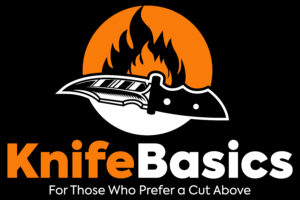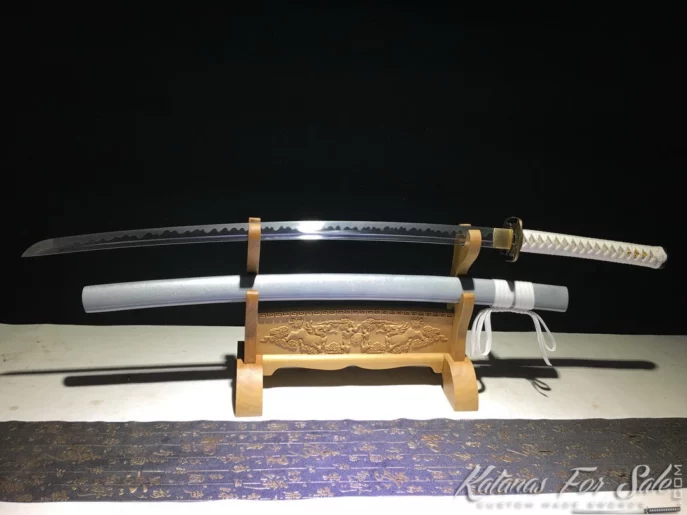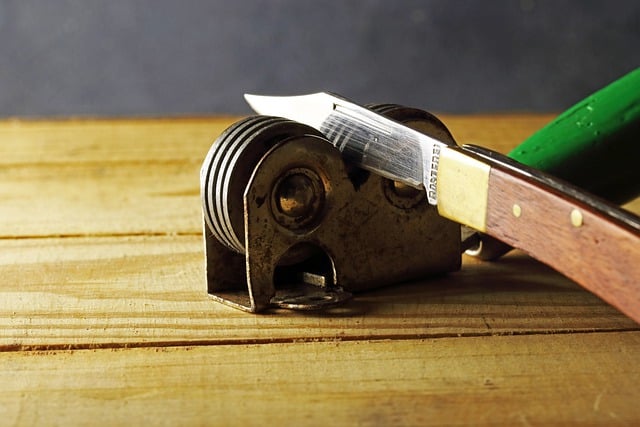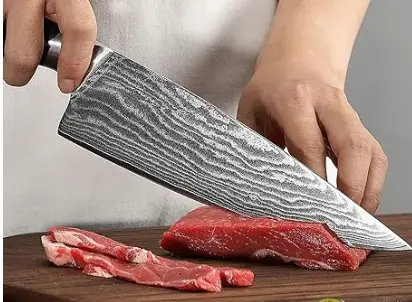Table of Contents
What is 1060 Steel?
1060 steel is carbon steel with a carbon content of 0.6% and is popularly used in the sword-making industry. The name 1060 comes from the AISI standard of naming with 1 signifying carbon steel and 60 signifying 0.60% weight percent of the steel is carbon. It contains other elements like Manganese and a few impurities such as phosphorous and sulfur.
With great heat treatment, 1060 steel achieves decent hardness, which contributes to great edge retention. It is also quite tough and durable. 1060 steel is highly sought by sword makers due to its ability to make swords that are tough, durable, and able to stay sharp for a long time.
1060 Steel Composition
- Carbon C 0.60%: Increases edge retention, hardness, and tensile strength. It also improves steel resistance to wear, abrasion, and corrosion.
- Manganese Mn 0.90%: improves the strength and hardness of steel. When the steel is heat-treated, hardenability is improved with increased manganese.
- Phosphorous P 0.03%: Considered an impurity but may Increase the strength and improves machinability of steel
- Sulfur S 0.05%: Improves machinability but is regarded as an impurity in high quantities.
1060 Steel Properties
1060 Steel Hardness
AISI 1060 steel has a Rockwell hardness of about 55 HRC which categorizes it as soft steel. With low hardness, steel offers excellent toughness which is a highly sought property in sword blades. A high-quality sword blade should be able to bend and handle pressure without breaking or chipping.
1060 Steel Edge retention
Edge retention measures the capacity of the steel to hold an edge and it is directly related to its hardness. With average hardness, 1060 blades remain sharp for a long time. The edge retention of sword blades is a great consideration because they are mostly used outdoors where there is no time to sharpen or the right sharpening tools.
1060 Steel Wear resistance
The wear resistance of 1060 steel is great. This means that 1060 sword blades are able to withstand abrasion. However, you should be keen on the usage of 1060 carbon steel swords. Be careful not to hit the swords against blunt objects like rocks because they are most likely to break.
1060 Steel Toughness
The toughness of steel defines its ability to withstand impact and pressure without breaking, chipping, or cracking and it is inversely proportional to hardness. With low hardness, 1060 carbon steel offers great toughness which makes it a great choice for sword making.
Because of the toughness level, 1060 swords can take a 45-degree bent and return to normal without breaking, this enables the users to get an almost perfect cut. 9260 steel however beats 1060 in the flexibility test.
1060 Steel Corrosion resistance
1060 steel is not stainless steel, as it lacks chromium elements in its alloy composition, therefore it is prone to rust. This calls for proper maintenance and frequent polishing. To keep your sword blades rust-free, ensure to wash and dry them immediately after use.
Washing 1060 sword blades are not special or complicated. It is as simple as wiping the blade dry and applying a thin coat of oil to increase corrosion resistance. If you plan to store your 1060 swords for a long time, consider using Renaissance Wax, which is mostly used in museums to preserve items.
Easy to work with
Sword makers love 1060 because it is not difficult to machine as long as you have the right machines and use the correct procedure. You can easily forge, anneal, temper, and harden 1060 steel as long as you are following the correct process.
AISI 1060 can also be folded into thousands of layers when forging to create a good grain pattern, folded 1060 swords tend to be stronger than normal non folded 1060.
Additionally, AISI 1060 is easy to sharpen because it is not very hard steel. With simple sharpening tools and basic sharpening skills, you will be able to get a sharp edge easily and fast.
Affordable
1060 steel is highly affordable and this makes it possible for sword makers to afford the steel for commercial production. Because it is affordable and easy to work with, the end product is reasonably priced as well, making 1060 steel swords a favorite of many.
1060 Steel Comparison
1060 steel vs 1045 steel
Both 1060 and 1045 steel belong to the 10XX family, but as the numbers show 1060 contains more carbon than 1045. With the increased carbon content, 1060 offers more hardness and therefore offers better edge retention and wear resistance.
On the other hand, 1045 shines in toughness and is easier to work with than 1060. 1045 steel swords are also relatively cheap compared to 1060 swords.
1060 steel vs 1095 steel
1095 steel is better than 1060 in edge retention and wear resistance, the improved performance in edge retention and wear resistance can be attributed to the increased carbon content in 1095 steel alloy composition.
1060 carbon steel is better than 1095 steel in toughness due to its reduced Rockwell hardness. Harder steels like 1095 tend to form hard carbides that are good for edge retention and wear resistance but are highway brittle and not favorable for demanding applications that require high impact toughness.
Is 1060 carbon steel good for katanas?
1060 carbon steel is a good choice for a budget katana. It has relatively low carbon content thus reduced hardness and edge retention, but this makes it easier to work with and forge. 1060 carbon steel offers great toughness and can easily bend to 45 degrees and return to its original shape.
Another added advantage of AISI 1060 steel when used in making Katanas is its ability to form aesthetically pleasing Hamon lines when properly tempered.
Is 1060 steel good for knives?
1060 steel can be a good choice for large heavy-duty knives but is generally not recommended for normal knives due to its inability to resist corrosion. There are other knife steels with excellent edge retention, toughness, and corrosion resistance better than AISI 1060.
Is 1060 carbon steel good for swords?
Yes, 1060 steel is good for sword making. It offers great edge retention, good wear resistance, and decent toughness. 1060 swords might not be the best out there, but they work just fine with proper usage and maintenance.
1060 swords are relatively cheap compared to the high-end spectrum of sword steel like 1084 steel T10 steel and 9260 sword steel. 1060 sword steel also has the ability to create aesthetically pleasing Hamons on a properly tempered blade.




